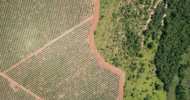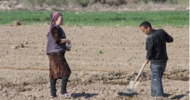
President Edgar Lungu and Zambeef Joint Chief Executive Officer Francis Grogan inspecting palm oil at Zambeef's Zampalm plantation in Muchinga Province, Zambia.
Zambeef shares tumble, as weak crop prices, wheat disease hit profits
Shares in Zambeef tumbled after the soybeans-to-eggs group marred the unveiling of an unexpectedly strong sale price for a palm oil asset with a warning that weak corn prices and fungal wheat disease had left it facing a loss.
The group revealed it had sold 90% of its Zampalm operation to the Industrial Development Corporation of Zambia, a state-backed fund, for $16m, with the potential for a further payment of $2m if the business meets performance targets up to 2020.
The sale brought Zambeef's exit from a palm oil industry the company felt it was "no longer essential to be involved in", following the entry of a "number of" new participants to the sector, making it "highly competitive".
The price achieved for Zampalm, which has some 2,900 hectares of its 20,200 hectares planted in oil palms, was lower than the $19m at which the operation is valued in Zambeef's accounts.
But it was bigger than the price that many investors thought the group would achieve, with Ed Hugo, at London broker VSA Capital, saying that "no-one thought Zambeef would get anywhere near that much" for what he termed a "stranded asset", outside the territory of the major palm oil groups.
Oil palm trees grow successfully in a relatively narrow band of tropical climates, with the likes of Liberia and Sierra Leone, closer to the equator, among more popular African countries for development.
Corn, wheat setbacks
However, the sale, which Zambeef termed "positive news", raising cash for paying down debt, was overshadowed by the group's second profits warning in three months, this time over "a number of serious challenges" at its cropping division.
One was a drop in crop prices, including a plunge of some 30%, to $160 a tonne, in corn values over the last four months.
Prices have been undermined by strong prospects for southern African production, including in Zambia, as Agrimoney.com reported last week, besides the weaker global market.
Furthermore, the group said the yield on its winter wheat crop, currently being harvested, looks like coming in 20% short of company expectations, thanks to losses to septoria, a fungal infection.
"This disease has always been present in Zambia and is part of the target of our fungicide spray programme," Zambeef said.
"The strain this year appears to be more virulent."
'Out of the blue'
"It is disappointing to report that largely external factors affecting the cropping division are likely to have a material adverse impact on group reported results," said Dr Jacob Mwanza, the Zambeef chairman.
The group said that it expected, at best, to report a pre-tax profit of $500,000 for the year to the end of this month, and potentially a loss of $2.5m, which would be the third result in the red in four years.
"That would be a disappointing result," Mr Hugo said, although one down, in wheat at least, to a setback likely to prove a one-off.
Zambeef shares closed down 8.0% at 10.70p, having earlier touched 10.183p, a drop of 12.2% on the day, and a 13-month low.
"It may be that, longer term, people take more notice of the Zampalm sale," which "came out of the blue, and represented a decent amount of money for something many people had written off".
--
Disposal is aligned with the Group’s strategy of focusing on its core business of the production and retailing of cold chain meat and dairy products, cropping and stockfeed.
Proceeds will be used to further pay down the Group’s debt and thus reduce gearing and interest costs.
Background
Zampalm was incorporated in 2009 following Zambeef’s acquisition of Zamanita Limited (”Zamanita”) in order to develop an oil palm plantation and crushing mill in Zambia as a continuation of its strategy of vertical integration.
--
September 6th, 2017
Zambeef (AIM: ZAM), the fully integrated cold chain food processing and retailing group with operations in Zambia, Nigeria and Ghana, announces that it has entered into a Share Sale Agreement, a Shareholders’ Agreement and a Management Agreement (together, the “Agreements”) with the Industrial Development Corporation of Zambia Limited (“IDC”) for the sale of 90 per cent. of Zambeef’s shareholding in its wholly owned subsidiary, Zampalm Limited (“Zampalm”) to IDC for a cash consideration of USD16 million (the “Consideration”) (the “Transaction”). For more information on IDC, please see the notes section.
Transaction Overview
Disposal of 90 per cent. of Zambeef’s shareholding in Zampalm (after loan capitalisation, as referred to below) to IDC for a total cash Consideration of USD16 million.
USD16 million cash to be paid on completion, with a further Performance Amount of up to USD2 million dependent on performance milestones over the three years from 2018 to 2020.
Disposal is aligned with the Group’s strategy of focusing on its core business of the production and retailing of cold chain meat and dairy products, cropping and stockfeed.
Proceeds will be used to further pay down the Group’s debt and thus reduce gearing and interest costs.
Background
Zampalm was incorporated in 2009 following Zambeef’s acquisition of Zamanita Limited (”Zamanita”) in order to develop an oil palm plantation and crushing mill in Zambia as a continuation of its strategy of vertical integration.
In addition to its position as a leading edible oil and soybean meal producer, Zamanita also owned the only solvent extraction plant in Zambia.
It is estimated that 50%-70% of Zambia’s edible oil consumption of approximately 120,000 M.T. per annum is imported as finished edible oil from the Far East, East Africa and South Africa. Zampalm was created to substitute those exports and produce palm oil entirely in Zambia for the domestic market.
Zampalm owns 20,238 Ha of land on title in the Northern Province of Zambia, on the Eastern side of Lake Bangweulu, to the North-West of Mpika town. Zampalm currently has approximately 413,362 palms planted over an area of 2,911 Ha in the main plantation, with another 172,000 seedlings in the main and pre-nursery. The first crushing mill (2 tons/hr) was established in 2016.
As at 30 September 2016:
The assets of Zampalm had a book value of ZMW189.8 million (c.USD19 million), representing approximately 6.3 per cent. of the Group’s gross assets;
The revenue attributable to Zampalm was ZMW135,000 (c.USD12,465), accounting for 0.006 per cent. of the Group’s turnover; and
Zampalm recorded a loss after tax of ZMW1.6 million (c.USD0.15 million).
Rationale
In 2015, Zambeef disposed its entire 100 per cent. shareholding in Zamanita to Cargill Holdings BV. The rationale for the Zamanita disposal was as follows:
The Zambeef Board wished to re-focus its strategy on its key business areas of retailing of cold chain meat and dairy products, cropping and stock feed, and therefore resolved to dispose of assets and businesses that were non-core;
From 2009 to 2015, the oil seed crushing industry had matured and a number of new participants had entered the market, thus making this sector highly competitive. As a result, the board of directors of Zambeef (the “Board”) felt that that it was no longer essential for Zambeef to be involved in this industry, as the primary production of crude palm oil was not core to the Group, and there were enough other market players who now supplied high-quality soybean meal at a competitive price. Furthermore, oil seed crushing is a highly specialised and capital intensive business which is also exposed to fluctuations in foreign exchange rates and commodity prices.
Following the disposal of Zamanita, the Board has reviewed its strategy for Zampalm and concluded that given the long timescales required to create value from a greenfield project, it was in the best interests of Zampalm stakeholders to seek a new majority shareholder. IDC represent the ideal partner given its mandate of working with the private sector to deliver long term economic transformation.
Transaction Details
Disposal of Zambeef’s 90 per cent. shareholding in Zampalm (after loan capitalisation as referred to below) to IDC for USD16 million.
Zambeef will retain a 10 per cent. shareholding.
USD16 million cash Consideration paid on completion.
Further Performance Amount of USD2 million paid over 3 Performance Periods, as follows:
a) First Performance Period (1 October 2017 – 30 September 2018) – First Performance Amount of USD666,667 to be paid on or before 31 December 2018;
b) Second Performance Period (1 October 2018 – 30 September 2019) – Second Performance Amount of USD666,667 to be paid on or before 31 December 2019; and
c) Third Performance Period (1 October 2019 – 30 September 2020) – Third Performance Amount of USD666,667 to be paid on or before 31 December 2020.
Payment of the Performance Amounts above shall be contingent upon Zampalm achieving not less than 80 per cent. of the specified projected Fresh Fruit Bunch (“FFB”) yields and Crude Palm Oil (CPO) production in any given Performance Period.
In the event that Zampalm fails to meet the projected FFB yields and CPO production in any given Performance Period, Zambeef shall not be entitled to claim the Performance Amount for the applicable Performance Period.
Zambeef currently has in place two shareholder loans to Zampalm totaling ZMW128.7 million (c.USD14.3 million) as at 1 June 2017, which will be affected as follows by the Transaction:
a) First Inter-Company Loan of ZMW106.4 million (c.USD11.8 million) as at 30 September 2016, which will be capitalised by Zambeef into new ordinary shares of Zampalm prior to Completion;
b) Second Inter-Company Loan – Zambeef’s continuing shareholder loan from 1 October 2016 to Completion date, which stood at ZMW22.4 million (c.USD2.5 million) as at 1 June 2017. This Second Inter-Company Loan shall be applied towards Zambeef’s shareholder contributions for the three financial years 2018 to 2020 and Zambeef shall not be obliged to make any further contributions to Zampalm beyond the value of the Second Inter-Company Loan.
Each party commits to paying its share of the projected net cash outflow over the next three years (2018 to 2020) before the project is expected to become profit generating. Each party shall pay its contribution annually in advance on or before 30 September of each financial year.
Conditions Precedent
Completion is subject to certain conditions precedent to be satisfied within 180 calendar days following signing of the Agreements (the “Conditions Precedent”), including:
That the Zambia Competition and Consumer Protection Commission (CCPC) provides either negative clearance or its approval to the transaction, or if conditional approval is obtained, that the parties accept such conditions in writing within 14 business days of receipt of the CCPC’s notification;
That AIM, the Lusaka Stock Exchange and the Securities and Exchange Commission are notified of the transaction, insofar as may be required in terms of the Rules and the Securities Act and the requisite approvals have been obtained;
Zambeef having capitalised the First Inter-Company Loan by the creation of new ordinary shares in Zampalm that shall be allotted and issued to Zambeef prior to Completion;
To the extent necessary, Zambeef having obtained the consent of its lenders to effect the Transaction, including the discharge of any encumbrances on the property and assets of Zampalm;
Zambeef having transferred the “Zampalm Limited” trademark to IDC.
Effective Date
The effective date for the Transaction shall be the date of the fulfilment of the Conditions Precedent.
Application of the Proceeds
This Transaction will allow Zambeef to unlock value, via a reduction in overall gearing, and in so doing reduce interest costs.
Categorisation of the Transaction on the Lusaka Stock Exchange
The Transaction is classified as a Category 2 transaction in terms of Section 9 of the Lusaka Stock Exchange Listings Requirements. Accordingly, it is not subject to approval by Zambeef shareholders.
Dr. Jacob Mwanza, Chairman of Zambeef, commented:
“This transaction is in line with and a continuation of the Group’s strategic vision, which will allow Zambeef to focus on growing its core business, which is the production and retailing of cold chain meat and dairy products, cropping and stockfeed, delivered through the Group’s extensive processing, distribution and retail network. Furthermore, the transaction will allow Zambeef to continue to reduce its overall gearing, and in so doing, reduce interest costs.”














